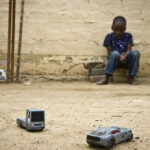A desperate South African breast cancer patient pleaded with the United Nations (UN) on Thursday to help her access a drug that can save her life.
Thobeka Daki (48) asked the UN high-level panel on access to medicines, at a Johannesburg meeting, to help her to get access to the drug trastuzumab. Marketed under the name Herceptin, the drug is produced by the pharmaceutical company Roche. “Last December my doctor told me the cancer in my breasts had spread to my spine. I know there is a drug that can save me but there is no way to get it,” Daki said. The mother of two receives treatment for her cancer from the Eastern Cape’s public sector.
With stage four breast cancer, Daki’s chances of survival are fading.
According to South Africa’s Fix the Patent Laws campaign, Herceptin is unavailable to her in the public sector and costs almost R500 000 for a year’s treatment in the private sector.
In comparison, a generic version of the drug produced in India costs a fraction of this at about R 150 000, but is blocked by Roche’s patent which expires in 2023.
Research shows that Herceptin improves the survival rates of breast cancer patients by up to 37%. Without this hope, Daki told the Mail & Guardian: “I think I’m going to die”.
The UN panel was convened last November by UN secretary general Ban Ki-Moon to “address the policy incoherence between intellectual property laws and access to health”. It is comprised of 16 international experts, including the former presidents of Botswana and Switzerland.
On Thursday the panel hosted its second “global dialogue” in Johannesburg, and heard arguments from civil society, industry and policy makers about solutions and barriers to accessing health technologies and promoting innovation. The first such panel was held in London on March 10.
South Africa’s biggest HIV lobby group, the Treatment Action Campaign (TAC), delivered a declaration to the UN panel appealing for “ambitious” recommendations when the panel presents its report to the secretary general in June. The declaration was supported by 25 other civil society groups from around the world.
In this declaration the TAC said the world is “poised on the threshold of a historic opportunity to redress the policy incoherence and imbalance that exists” between rights of companies, backed by trade laws, and basic human rights in respect to public health.
“Whether it is women in Wales who cannot get the breast cancer medicine they need, or people in South Africa not being able to access hepatitis B or tuberculosis medicines, we refuse to accept that any person on the planet has to go without the medicines they need,” said the TAC-led group.
Daki, one such person in need, is desperate. She pleaded: “It’s not only me. There are thousands of women in South Africa who also need this drug. I am really begging the government to give us access.”
Amy Green was a health reporter at Bhekisisa from 2013 until 2016.





